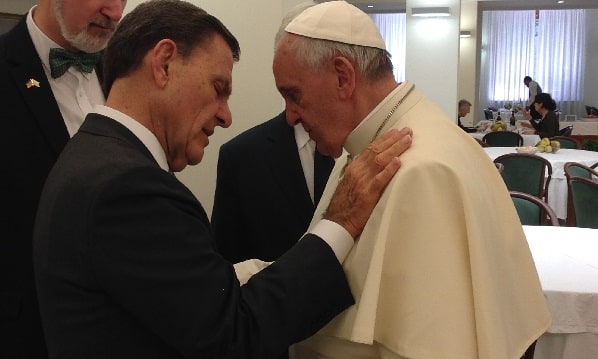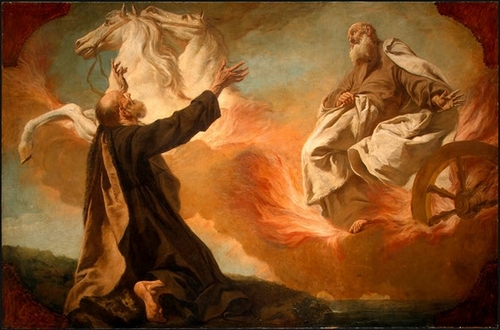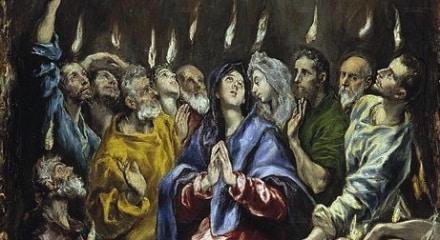Recently I attended a Baccalaureate Mass, and I couldn't help but to feel the generally awkward vibe that tends to arise whenever Communion comes around, especially when the priest must explain that those who aren't Catholic may come forward and receive a blessing, but may not otherwise partake in the reception of Holy Communion. Maybe I am projecting, but it seems to me that such a statement (however gently uttered) can often come across as somewhat gosh and rude, especially in a climate where the very mark of politeness is to never exclude anyone from anything.
Thus, in our world today, the question is how might one even begin to explain the rationale behind something that seems to an outsider little more than an imperious dictate of the Catholic Church? Below I present ten possible approaches to this
dilemma of hospitality. There are no quick fixes below because there are no quick fixes to the divisions among Christians. Yet, if nothing else (hopefully), there is at least the possibility of offering a more gratifying and sympathetic response than what tends to be the case (this is assuming that people attempt at all). Exceptions to this rule are duly noted, but this is more a guide to how to broach the topic in a way that invites discussion rather than a purely awkward exchange. Incidentally, this is not an indictment of any priests particular style, but rather some further options for those who wish to offer an explanation to friends, family, or anyone else who may be interested.
1. An Appeal to the Sacred
One approach might involve focusing on the preciousness of this Sacrament in the life of Catholics. Everyone (presumably) has something that they would deem priceless, something that they would cringe to think that someone might abuse, mock, or mishandle (a family heirloom, a daughter, a bullied child). Figure out what that person holds in highest regard, and use this as a metaphor to explain why the Church is so particular about how the Eucharist should be safeguarded.
Thus, if one can understand the need for reverence in the one instance, how much more warranted would such behavior be when handling God Himself.
2. An Appeal to Intimacy
Another way to explain the Church's view surrounding the Eucharist involves employing the language of romance and intimacy.
To put it another way, just as one shouldn't use the gift of sexuality in an indiscriminate way, neither should one approach communion with God (viz. becoming one with God) as if it required nothing up front. Just as it is loathsome and dangerous to speak of God's name carelessly and without affection, or to enter the marriage bed without first being married, so also this act of union with God must be entered into fearfully via a covenantal process.
3. A Club/Organizational Approach
No matter what the organization, if you are invited as a guest to attend a function, it is more than a little presumptuous to assume that you would immediately participate as a full member would. In order to be a true beneficiary of all of the most cherished traditions of an organization, one cannot simply swoop in for a meeting (or a game) and expect to be a full participant. You must, as it were, go through the appropriate channels and rites of passage in order to enjoy what full memberships entails.
To participate in the Eucharist in this sense is much more than just something you do because you prefer to to be included in the ceremony. Rather, it is a testimony, a sign of your absolute commitment and dedication to the mission and purpose of the organization (or at least that is as it should be).
Can the individual who wishes to receive the Eucharist in this instance say this about their intentions?
4. Not Receiving Communion Can Also be a Sign of One's Dignity
If you reject the pope's authority to speak infallibly on matters of faith and morals, or you do not believe that the Catholic Church is the true of Church of Christ, then you should not be ashamed to declare this. One of the best ways to assert this conviction is by not receiving communion at Mass. Whatever you deem to be true in the most noble sense of the word, you should hold it with conviction and purpose. There is a certain power in knowing what you believe and what you do not. However, to state on the one hand that you reject the Church's authority, while simultaneously receiving a Sacrament that states that you embrace it, seems at best confusing. There is something beautiful in receiving communion for good reason, and something beautiful in abstaining for good reason. Both of these choices are no doubt honored by God.
5. A Scriptural Approach
If you grew up like me hearing stories about the Ark of the Covenant, and how you didn't touch it lest you encounter the wrath of God, then you too may have had a healthy fear of God's Holy Vessel. Hence, if the exterior of the ark was so dangerous to touch, then how much more dangerous would it be to touch all that was inside (i.e. the manna, the Commandments, and the rod of Aaron). According to Raiders of the Lost Ark (which is of course a highly reputable source), to even open the Ark could lead, inevitably, to a face-melting experience.
Fast forward to the new Testament, wherein St. Paul warns in a similar fashion that to receive this "new manna" in an "unworthy" manner, can potentially lead to physical illness or death, and may even kill the soul altogether. Consequently, it is not out of a lack of hospitality or kindness that the Church places limitations on who can receive holy Communion, but rather out of obedience to what St. Paul says. These are fearful matters (in both senses of the word). And so, like the Ark, it would behoove everyone (including/especially Catholics) to "use as directed."
6. The Standard Applies to Everyone... Equally
The question I sometimes ask my student's is this; "Are there situations in which Catholics are not permitted to receive Communion?" Yes. Why? And eventually they come to it.
The rules for Communion weren't established as a rebuke for Protestants, but as a standard for everyone, including Baptized Catholics. One could just as well say that the rules of communion are in place to prevent (in certain instances) baptized Catholics from receiving communion. Any human can receive Communion, no matter what religion or denomination they hail from, and any human may potentially be prevented from receiving communion, even if they are Catholic. The ultimate litmus for receiving communion is not what background you are from, but whether or not you choose to be in communion with the Catholic Church… for that is, in part, what the action itself implies. As for myself, I do not receive communion because I am a baptized Catholic, I receive it because
I will, by the grace of God, to remain in union with the Church. Anyone else may do as much.
7. Turning the Question Around
Do Protestants ever limit who can or cannot receive communion? Up until about fifty years ago, most Protestant denominations did not permit inter-communion for the same reason Catholics do not today. If you didn't share the same beliefs, why would you then share a covenantal meal with them that suggested that you did? Today, however, many denominations insist that as long as you are baptized you may receive communion. Yet this too begs the questions; "Why should we draw the line there? Isn't that too exclusive? Suppose someone of good will would like to receive communion, but they are not Christian. Why exclude them? And what does communion mean as a concept in the first place?" By addressing the question in this fashion, it may expose something which has progressively gone missing from Christian theology- the importance of the sacred (i.e. that which is set apart for God). In the process of avoiding the appearance of any inhospitality, we have sacrificed the sacred in many ways. Indeed, by leveling off everything, we have massaged away the things that truly distinguish us (i.e. sacred objects, sacred rites, sacred books, and sacred names). Thus, by progressively opening communion to everyone, we slowly have abolish the very meaning of it.
8. …But What About Those Who Believe That the Eucharist is More Than a Symbol

To repeat, the reception of Holy Communion (assuming one is in a state of grace) is the ultimate sacramental sign that one is in union with the Catholic Church. If the individual attending Mass is a Protestant, and wants to receive communion, the question then becomes are you really on board with all Church teaches (i.e. The Church's teaching on sexuality, Mary, the Eucharist etc.)? If you do not wish to subscribe to these ideas, then why would you publicly engage in an activity which states otherwise? And if you do believe all of these things… then why aren't you already Catholic? This line of reasoning may have particular force, especially for those who maintain that the Eucharist is much more than just a symbol (viz. Episcopalians and Lutherans). The theological differences surrounding the Eucharist may seem negligible from their perspective (i.e. transubstantiation vs. consubstantiation… see above image), but the larger issue still remains.
Receiving Communion is not only about saying "Amen" to the theology of the Eucharist, but about saying "Amen" to everything that the Church holds definitively.
9. Confronting the Charge of Inhospitality
It is not inhospitable to balk at a house guest who thinks it perfectly natural to enter someone else's home and start dictating the rules of the house. I certainly wouldn't go to someone else's home and do the same. The Church continues to open her schools, hospitals, charities and places of worship to those of different religious persuasions, but she also asks respectfully not be forced to compromise the values that she holds most dear.
10. An Historical Explanation
 |
| Lord, I am not worthy to receive you... |
Most individuals simply look at this issue in the context of modern day society. Thus, it may be useful to consider this issue from a larger historical perspective. In other words, historically speaking, what has the Church taught concerning this issue throughout history. For the most part, Catholic teaching hasn't changed on these matters.
It's not as if the Protestant Reformation happened, and all of sudden the Church started excluding people from Communion. What the Church did pre-Reformation, the Church did post-Reformation, and what she did from the jump, the Church does today. It has been the historical been practice of the Church to exclude from communion those who do not practice the Catholic Faith in all its essentials (or those who publicly reject it).
No one is worthy of the Eucharist (which is why we state as much at the Mass). Catholics receive it
not because we are "worthy", but because, among other things, we accept Catholic teaching (e.g. "real Presence"), and remain united to the Faith, whatever our own personal shortcomings. Exceptions can be made in cases where people believe, and wish to convert, but for whatever reason are limited by their circumstances. However, the common denominator in all of these situations is a concrete desire to identify one's self with the Catholic teaching.
11. What About the Orthodox Churches?

I do not begrudge the fact that the Orthodox Churches prohibit me from receiving Holy communion at their Liturgies (incidentally, they do it for the same reason the Catholic Church does it… see #10). Nor am I offended that, while they are permitted to receive communion at ours, their bishops will not allow it. Why doesn't it bother me? Leaving aside the whole complicated history, as well as the unique bond between the Roman Catholic and Orthodox Churches, anywhere that a religion regards the sacredness of an action so much that they take precautions to safeguard that action, I can truly appreciate that. Hence, when the Jews get irritated with Christians for using the unutterable name of God in certain religious songs, I get it. And when Muslims believe that holy figures should not be depicted in any way, shape, or form, I can see the wisdom in that. And when the Mormons have a more "inclusive" religious service for anyone interested in the faith, while reserving a more private gathering for those who are committed Mormons, I do not see a problem with that.
I am at peace with my own Faith, and I am happy whenever and wherever God is being honored, even if I am not privy given a "front row seat" at that affair. I do not need to be expressly included in a particular religious practice to appreciate and honor that practice. And if I were to be agitated by it, I should probably ask myself "why"?
12. What Should Priests Emphasize/Avoid
It is best to assume that most individuals are merely looking for instructions on what to do during this part of the Liturgy, rather than a theological explanation for why they can't receive communion. If you stop to dwell on the manifold reasons why some may receive and others may not, you may aggravate a situation that was otherwise copacetic. The point is a theological discourse should not be shoe-horned right before communion. Treat it as if it were assumed, and proceed from there, especially at those events that make this issue most challenging (i.e. funerals, weddings, and baccalaureates, etc.). The priest might say (or some variant thereof); "For those who are not Catholic, or for those Catholics who may not receive Communion at this time for whatever reason, please
feel free to come up for a blessing, simply indicate this by…". I like to call it the "nothing to see here" approach. In my experience, explanations of a longer sort are more positively received when they are either addressed one on one, explained in a well articulated homily, or even provided in a written explanation in the program where one can read it without feeling that there are in the spotlight. Obviously this will not solve every issue, but avoiding certain "unforced errors" in this regard can be important when it comes to not exacerbating the problem.
13. Whatever your approach, say it with love and vulnerability

In all of this there should be love, charity, and vulnerability, not only for God's sake, but for the sake of one's neighbor. I know this from personal experience. The first time I ever tried to invite someone to Mass- and subsequently explain to them why they couldn't receive communion, it was nothing short of a disaster. I was "ham-handed" and extremely lacking in eloquence. My friend agreed to come with me to church, but after I botched the whole communion explanation, she rose up in rage, and declared angrily that "she didn't want to come to some my church anyway, especially one that thought that she wasn't good enough to receive communion". At that moment my heart broke, for that was the last thing I wanted to communicate. Right in front of her, I simply broke down. As she observed me, she suddenly had a change of heart, and began saying to me that she wanted to come after all. Her anger was miraculously quenched by my vulnerability under these circumstances. I am not arguing that you should weep your way out of every problem, but for whatever reason, my vulnerability helped to understand my motivation.
This issue will not be resolved by avoiding it, or by coldly laying down the law. Christ was crucified not because he sternly shouted out a bunch of dictates, but because with arms wide open, he spoke the truth in love.
14. The Sacrament Will Be Defined Down….
Not only is intercommunion a problem from an integrity standpoint (i.e. how can it be "communion" if you share a different view about the nature and purpose of communion), but by allowing intercommunion you inevitably reduce
the Sacrament to little more than a social convention, defined by popular opinion. In light of this, the Eucharist is doomed to become indistinguishable from the vague symbolic variants that are out there today.
Communion is meant for everyone, but not without respect to some kind of assent of Faith. Thus, in the end, the real reason to set limits on the reception of Holy Communion has nothing to with looking down on anyone, and everything to do with preserving the integrity of the Sacrament. After all, how can we maintain an appropriate level of reverence for Christ truly present in the Eucharist, if we do not even require that the one who receives it actually accepts this fact?




















